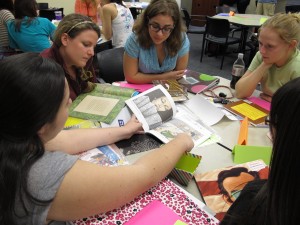Report: Five Florida Teacher Training Programs Are “Substandard”

StateImpact Florida / John O'Connor
University of Central Florida elementary education students discuss how to incorporate books, maps, magazines and other materials into lesson plans. The program earned strong marks in a new national ranking.
Update: Florida State College at Jacksonville is challenging the NCTQ rankings. The school argues it only has an early childhood education program, but NCTQ included the school in its ranking of early childhood education programs.
The school’s dean says early childhood and elementary education certifications have different requirements, and the two should not be combined.
Read Florida State College at Jacksonville’s entire argument here.
Five Florida teacher training programs have landed on a list of schools dubbed “substandard,” according to a new national ranking of education programs.
The National Council on Teacher Quality ranked more than 1,100 programs at education schools across the country on how well they teach reading, math, classroom management, special education and other criteria. The rankings are the first of their kind.
Five Florida schools earned a “consumer warning” label from NCTQ.
“Teacher candidates are unlikely to gain much, if any, of value in return for their investment,” the report says. “Further, school districts should be aware that in our view these programs only provide minimal, substandard training to their candidates.”
Those schools are: Chipola College; Edison State College; Florida State College At Jacksonville; Northwest Florida State College; and St. Petersburg College.
One Florida school was singled out for praise: The University of Central Florida. The report named UCF to its honor roll for secondary education programs with low tuition. The school also earned the highest rating in the nation for special education training.
We recently profiled the University of Central Florida’s education program with The Hechinger Report. You can learn more about what Florida education schools are doing to recruit students.
The NCTQ report is not without critics. The organization is funded by the Bill and Melinda Gate Foundation, which has advocated for test score-based teacher evaluations and other ways to boost teacher quality.
The study also looked at what education schools were teaching, and not how those graduates performed in the classroom.
“These rankings do not have a great deal to do with program quality,” Linda Darling-Hammond, a professor at the Stanford University School of Education, told Reuters.
Some schools did not cooperate with NCTQ researchers, refusing to provide requested documents.